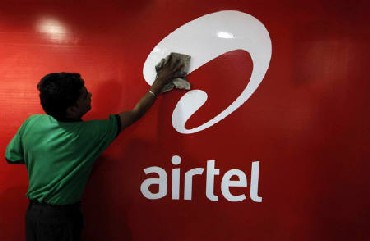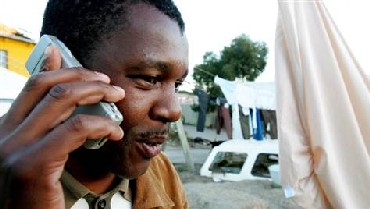
The man: Manoj Kohli, the affable CEO of Bharti Airtel's international business. The challenge: Replicate Bharti's low-cost operational model so successful in India across 16 diverse African countries, including Nigeria, Kenya, Ghana and Congo.
The strategy adopted: Drop tariffs, expand the market and make money through economies of scale one that has worked well in India.
Kohli outsourced key operations the telecom network, IT and call centres to leading vendors like IBM, Ericsson and Nokia Siemens, among others, just as Bharti had done in India.
This involved shifting nearly a third of the 6,500 African employees of Zain whose African assets Bharti bought last year for $9 billion to these new partners.
...

Employees feared they would lose their jobs. So, Bharti offered them a package they could not refuse: Everyone would be transferred on existing terms and conditions; and they had the option to come back into the Bharti fold within two years.
This ensured Zain's operations were not flooded with expats from India. Most ex-Zain employees have been put through a rigorous retraining programme, imbibing the Bharti way.
About 1,500-odd employees, who earlier worked for Zain, have been moved to the new partners, and more are in the process of being moved.
A satisfied Kohli, who sits in Nairobi and flies to India once in a while to attend review meetings, says: "I believe that Zain now smells like Bharti."
...

Kohli is also pushing through another key element of the Indian strategy cut tariffs, expand the market and make money through economies of scale.
The goal: More than doubling the subscriber base from the present 45 million to 100 million by March 2013.
Bharti's aggressive price war in the African markets has brought down tariffs by 50-100 per cent in many countries.
"When we took over Zain, their tariffs were at a premium of 30-40 per cent. We were clear that this won't work and brought it down to competitive levels," explains Kohli.
But Kohli is aware that he has to improve average revenue per user, which has dropped by three per cent.
After all, he has set some aggressive targets for himself he wants to increase the Ebitda of the African operations from the current 26 per cent to 40 per cent (which will be akin to that in India) by 2013, and hit revenues of $5 billion in the same timeframe.
...

Some of it will come from business volumes, and some from the two new focus areas that Kohli has chosen "rollout of 3G services and expansion of m-commerce all across our markets".
He is also investing over $1.2 billion to roll out more networks and services.
He says they have already received licences to operate 3G services in 10 countries and hopes additional data revenues will soon kick in. He is also talking to governments for 3G licences in the remaining six countries.
And, he hopes the popularity of m-commerce in Kenya can be replicated in all other African countries.
Costs are also being cut. Talks are on with all competing telcos MTN, Millicom and Orange, etc to share tower and fibre infrastructure and, maybe, later have a JV tower company. The tower businesses have been spun off into separate companies that will get business from competitors.
...

Bharti is also pushing governments to reduce high interconnect rates (the rates at which telcos terminate calls on each other's network). Kohli says the company has already succeeded in doing so in Kenya and has passed on the benefit to customers in the form of low tariffs, forcing others to follow suit.
Analysts caution that the Zain acquisition has been a drain on Bharti, pulling its financials down dramatically.
With losses of Rs 416 crore in the March quarter this year from its African operations and an Ebitda margin of only 26 per cent, analysts say the former Zain assets are not good for the company.
Bharti Airtel's net profits in the same quarter fell by 31 per cent despite reasonable growth in India.
...

Kohli, however, is clear that the company is in Africa for the long haul; he is not worried about short-term losses, as long as margins improve.
He is concentrating on building the Airtel brand in Africa from scratch into a household name. Accordingly, the company has decided to spend around five per cent of its revenues on building the brand across 16 countries.
The next stop is to engage with government and regulators to find ways to reduce costs and, thereby, tariffs, and cater to their concerns.
"Most African governments ask us two key questions one, how will you roll out in rural areas, and, second, how can you become more affordable. We have told them that we can roll out in rural areas if there is USO funding support."
...

These are questions that Bharti is well-equipped to answer, considering its experience in India.
Kohli says, "African telcos have also used the high-cost western model as their reference and that is why their costs are 50-100 per cent higher than those in India. That has to change. And, now some of our competitors are also looking at our low-cost delivery model."
Whether or not Kohli and his team will be able to pull this one through remains to be seen.
...